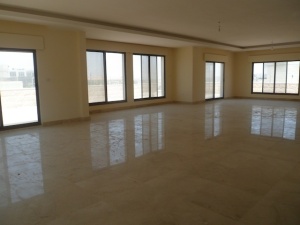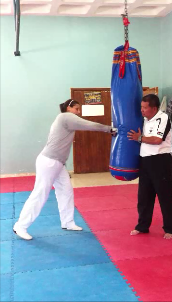Story and photos by Samantha Laine
AMMAN, Jordan – Tariq Al-Nami, 70, and his fellow Iraqi friend drink tea with mint outside a restaurant in their northwest Amman neighborhood. Nami retired to Rabiah three years ago to find some desperately needed relief from the reality and volatility of his homeland in Iraq.
“The government can’t save themselves, so they can’t save us,” Nami said, gesturing with his hands in between sips. “Here in Jordan, I can walk outside on the street at night. Not like back there.”
A retired furniture vendor, Nami said that when the Coalition forces launched an attack in 2003, the offensive destroyed much of Iraq’s infrastructure, leaving the country in turmoil. There were frequent explosions. The government cut the electricity for 20 hours a day. Healthcare was suddenly so diminished that Nami, who has colon cancer, had no choice but to seek his life-sustaining treatment in Amman.

This rooftop penthouse in the Abdoun neighborhood of Amman has four bedrooms and five bathrooms for a total of 3,660 square feet. It is currently going for 450,000 Jordanian dinar, or about $635,000.
Nami bought a three-bedroom, three-bathroom apartment that measured a little more than 1,600 square feet for 125,000 Jordanian dinar, or about $176,000. Like so many of his wealthy peers who come to Jordan from their war-torn homeland, he paid for his flat in cash.
“The [Iraqis] who come are upper class. They have higher education and most of them worked in the government back in Iraq,” he said.
Today, nine years after the war began, Iraqis are still moving in and buying houses. And the ones already here are sinking even more into the market – buying three and four apartments each. As a result, there’s a boom in Amman’s real estate and housing prices – which is good for landlords, but difficult for locals who now can’t afford to buy their own place.
“Maybe it’s good for the economy, but not good for the people,” said Zuhdi Mahmoud, 30, the managing director at Cityscape, a real estate company located in Amman. “I’m a real estate agent; I will welcome anyone to buy a house. But at the end of the day, I’m one of the people that can’t afford a house.”
From 2000 to 2010, revenue from the annual real estate market increased from $93 million to nearly $381 million – a spike of more than 400 percent. Many of those numbers reflect purchases made by Jordan’s estimated 450,000 Iraqis, who are the No. 1 foreign investors in this country of 6.5 million Jordanians.
In 2010, for example, Iraqis bought about 2,000 houses and apartments – a total investment of more than $286 million. That’s about the same number in one year that the previous three years together produced. (From 2007 through 2009, Iraqis purchased a total of 2,623 houses and apartments and spent about $260 million in Jordan.)
Wael Al-Jaabari, the CEO of Abdoun Real Estate, started his Amman company in 1990. Around that time, he said an American economist told him that if he stayed in Jordan real estate, “he would see money like he’s never seen before in his life.” He said the American was right.
“Since then, there’s been one boom right after the other,” Al-Jaabari said. The Central Bank also contributed to the real estate boom, when in 2006 it began offering 20- to 25-year mortgages instead of the previous five-year mortgages.
“The Iraqis got lucky,” Al-Jaabari said.
In addition, many experts agree that there’s a qualitative difference in the way the Iraqis come in to Jordan. In general, most of them fled flush with cash and as business investors with the intention of staying permanently. Others who come, such as the more recent influx of Syrians and Libyans, are there only because it’s safe; they fled under fire, and above all else, they want to get back home.

Tariq Al-Nami, 70, is one of the 450,000 Iraqis who has found refuge in Jordan. He plans to spend his retirement years in his 1,600-square-foot apartment in the Rabiah neighborhood of Amman.
Ali Mustafa Al-Assaf is an economist and business researcher at the Center for Strategic Studies at the University of Jordan. The center analyzes real estate prices and identifies trends in the market. Assaf said the prices began their drastic increase in 2003, corresponding with the Iraqis’ long-term settlement in Amman.
“They have a lot of money . . . When they came to Jordan, they didn’t come as refugees, they came as investors,” Al-Assaf said. This sudden demand caused the prices to increase. “Take a square meter here in Amman that cost 250 JD (about $350). After the Iraqis came, it went to 500 JD (about $705),” he said.
The real estate market is currently stable, and prices remain high. Fewer Iraqis are moving to Jordan, and yet they are still Jordan’s highest non-domestic investor. As a point of reference: If in 2010, Iraq was responsible for about $286 million in property investments, Saudi Arabians, second in foreign investments, only bought about $43 million in Jordanian real estate.
Mahmoud, the managing director at Cityscape, said that roughly six out of 10 landlords he deals with are Iraqi, and each one owns three or four apartments.
“I know in 2003 and 2004 Amman was booming because of the Iraqis. Now, they still come and buy because they consider Amman their second country,” Mahmoud said. “If they have one property, they will buy another one.”
He also said that the Iraqis who came starting in 2003 now have children who need homes. Since they have settled in Amman, they – the financially supportive parents – continue to buy for their children.
“Say the family has a son and a daughter: The parents will buy properties for both of them. And I don’t think they buy anything in Iraq,” he said, noting that a whole new generation of Iraqi investors will eventually emerge and continue to invest in Amman.
“Traditionally, the parents buy for the kids,” he said. “That’s the Arab culture.”




